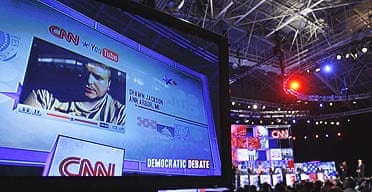The organisers of next year's key US presidential debates are planning to dispense with much of the old formula and incorporate the free-wheeling, irreverent style of the website YouTube and other new media favourites.
Presidential hopefuls, television companies and political websites today judged as a success last night's experimental debate organised by CNN and YouTube.
The eight candidates for the Democratic nomination faced two hours of questions, not from journalists but from a cross section of Americans submitted in 30-second video clips.
The debate, in the Citadel military college in Charleston, South Carolina, included questions about Iraq from a mother whose son was to be deployed there and a father who had lost a son in the country, about health from brothers spoon-feeding dinner to a father suffering from Alzheimer's, about Darfur from an American in a refugee camp, and about gun laws from a man cradling a rifle which he described as his "baby". Some questions were gimmicky and aimed at winning laughs.
One of the organisers said the debates were livelier than previously and that it would now be impossible to return to the old format. Although the candidates at times seemed uncomfortable with the uncertainty, listening with fixed grins, their campaign managers today claimed it had been refreshing.
Joe Trippi, who is part of John Edwards' campaign, said: "I thought it was great. It was more free-wheeling."
David Axelrod, the campaign strategist for Barack Obama, said: "I think he [Obama] relished this. He thinks the American people have been cut out of Washington politics."
The debate was slowed down, with eight candidates present. In the presidential debates in the run-up to next year's election, in November, there will only be the Democratic and Republican nominees, and the format might be more effective.
Kathleen Hall Jamieson, an academic and co-author of a history of presidential debates, called the move a milestone. The humour in some of the videos inspired interest in topics that might otherwise bore viewers, as did the images of "real" people talking about troubles in their lives, she said.
YouTube bloggers generally welcomed the format but objected to CNN choosing the questions: 39 were selected from almost 3,000 video clips sent in.
Typical of the directness of the format was Jordan Williams, a student from Kansas, who asked Mr Obama whether he was "authentically black enough".
Mr Obama said he had suffered the same difficulties as other African-Americans in hailing a taxi in New York: "You know, when I'm catching a cab in Manhattan in the past, I think I've given my credentials."
The same questioner asked Hillary Clinton if she was "satisfactorily feminine enough". She replied: "Well, I couldn't run as anything other than a woman."
The candidate Joe Biden won laughs in response to the man who dubbed his gun his "baby": "I'll tell you what, if that is his baby, he needs help ... I don't know that he is mentally qualified to own that gun."
Ms Clinton emerged as the most competent performer. Afterwards, her campaign team highlighted online what they termed a naive admission by Mr Obama, who said he would meet the leaders of North Korea, Syria, Iran and Cuba in his first year - whereas Ms Clinton had said she would send envoys to test the waters first. But Mr Obama's performance overall was an improvement on his stumbling answers in earlier debates.
